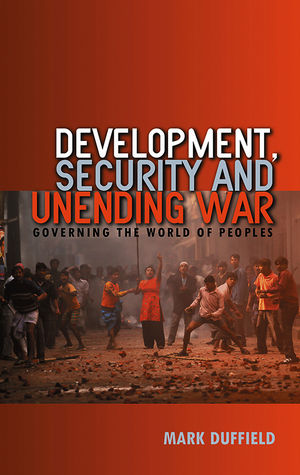Development, Security and Unending War: Governing the World of PeoplesISBN: 978-0-7456-3580-4
Paperback
280 pages
December 2007, Polity
 This is a Print-on-Demand title. It will be printed specifically to fill your order. Please allow an additional 10-15 days delivery time. The book is not returnable.
Other Available Formats: Hardcover
|
||||||
Chapter 1 INTRODUCTION: DEVELOPMENT AND SURPLUS LIFE .
The liberal problematic of security.
Biopolitics, liberalism and development.
Surplus population and accumulation by dispossession.
Slavery and excess freedom.
The biopolitics of development and underdevelopment.
Dividing insured and non-insured peoples.
From internal war to global instability.
Occupation and contingent sovereignty.
Disturbing the boundaries of time and space.
Chapter 2: PERMANENT EMERGENCY AND DECOLONISATION .
Total war and the paradox of biopolitics.
NGOs and total war.
The colonial inheritance.
Expansion without imperial reconciliation.
Emergency and the dilemma of development.
Cold War liminality and non-state sovereignty.
Sustainable development: knowledge makes free.
The question of agency: being the right type.
Postscript.
Chapter 3: THE EMERGENCE OF CONTINGENT SOVEREIGNTY.
From modernisation to sustainable development.
Emergency and contingent sovereignty.
Negotiated access and the humanitarian boom.
Emergency and the external sovereign frontier.
Chapter 4: MOZAMBIQUE, GOVERNMENTALISATION AND NON-MATERIAL DEVELOPMENT.
The background to a ‘complex emergency’.
The changing relationship with NGOs.
War and the destruction of culture.
The re-emergence of social cohesion.
Opposing economic differentiation.
Non-material development.
Gender, natural economy and land.
Concluding remarks.
Chapter 5: HUMAN SECURITY AND GLOBAL DANGER.
Human security as a technology of governance.
Internal war and the crisis of containment.
Globalising versus containing tendencies.
Reinstating the state.
Containing underdevelopment.
Unending war, human security and NGOs.
Chapter 6: AFGHANISTAN, COHERENCE AND TALIBAN RULE.
From negotiation to coercion.
The strategic framework for Afghanistan.
Development and security in practice.
Aid and peace-building in a failed state.
The limits of principled engagement.
Problematising state-based politics.
UNSMA and the critique of aid.
Concluding Remarks.
Chapter 7: FRAGILE STATES AND NATIVE ADMINISTRATION.
Fragility and global instability.
Contingent sovereignty and non-material development.
The governance state.
The fragile state and liberal imperialism.
Reintroducing native administration.
Culture and the limits of government.
The necessity of despotism.
Adjusting government to culture.
Technologies of post-interventionary governance.
Concluding remarks.
Chapter 8: RACISM, CIRCULATION AND SECURITY.
The collapse of the national/international dichotomy.
From race war to racism.
Liberalism, imperialism and culture.
Decolonisation and the new racism.
Racism and anti-racism.
Conjoining the internal and external frontiers.
Migration and the European state of exception.
The changing regime of internal development.
Concluding remarks.
Chapter 9: CONCLUSION: FROM CONTAINMENT TO SOLIDARITY.
The biopolitics of insured and non-insured life.
Development and Emergency.
Governmentalising petty sovereignty.
The biopolitics of unending war.
Is there an alternative development?.
The solidarity of the governed.
.
BIBLIOGRAPHY



